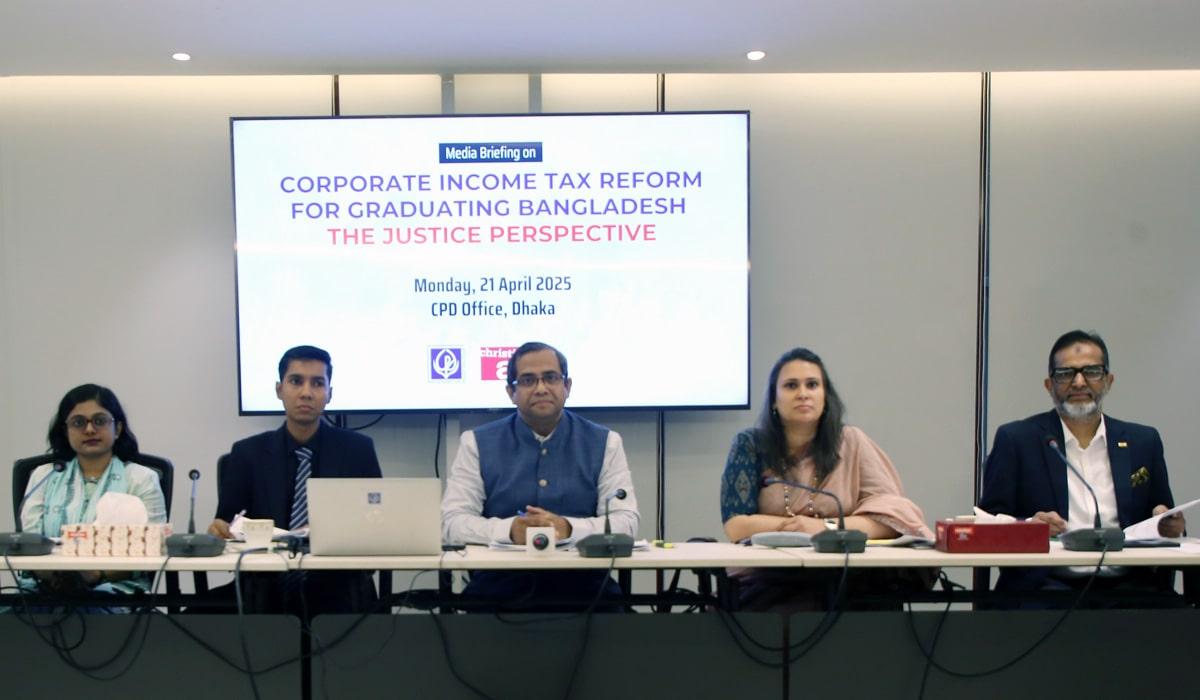
Presentation on Corporate Income Tax Reform
With Bangladesh set to graduate from Least Developed Country (LDC) status in November 2026, experts are calling for urgent reforms to the country’s Corporate Income Tax (CIT) system to ensure a smooth transition. The latest study by the Centre for Policy Dialogue (CPD) highlights the need to address tax revenue gaps, particularly as concessional financing decreases and Bangladesh faces rising financial demands.
The study was discussed at the media briefing titled ‘Corporate Income Tax Reform for Graduating Bangladesh: The Justice Perspective’ organised by CPD in partnership with the Christian Aid in Bangladesh on Monday, 21 April 2025. The session was chaired by Dr Khondaker Golam Moazzem, Research Director, CPD, who stressed the importance of aligning tax reforms with Bangladesh’s long-term development goals. ‘An efficient and fair tax system is key to achieving sustainable development and equity as we move towards post-LDC status’, said Dr Moazzem.
In her introductory remarks, Ms Nuzhat Jabin, Country Director, Christian Aid Bangladesh, remarked, ‘Our main objective is to address the structural causes of poverty—why people with limited income, those below the poverty line, remain in that situation. The core aim is to work on these structural causes and bring about meaningful, sustainable change’.
Mr Mohammad Zahid Hossain FCA, Former Group Chief Financial Officer of Rahimafrooz Bangladesh Limited said, ‘Not submitting your tax return is a direct disregard for the country’s laws and responsibilities. A responsible citizen should not have such an attitude. Filing tax returns is not optional—it is mandatory, and failing to do so reflects negligence and undermines the system.’
The keynote address was delivered by Mr Tamim Ahmed, Senior Research Associate, CPD, who outlined the findings of the CPD study, noting that while Bangladesh has seen some growth in corporate tax revenue, it is still far from the required levels to meet the country’s future needs. Mr Ahmed pointed out that CIT share in total tax revenue had decreased from a peak of 25 per cent in FY2015 to approximately 20 per cent in FY2024.
Currently, Bangladesh’s tax-to-GDP ratio stands at 8.5 per cent for FY2024, one of the lowest in South Asia. This figure is significantly below the 15 per cent target set by the Sustainable Development Goals (SDGs) for developing countries. Dr Moazzem highlighted that Bangladesh’s tax system faces multiple challenges, including tax evasion, non-compliance, and inequitable tax burdens across industries.
The CPD survey, which included responses from 123 companies across various sectors, revealed that 82 per cent of businesses consider the current tax system unfair. Key concerns include arbitrary tax assessments, delayed refunds, and inefficiencies within the tax administration. Businesses also reported spending an average of 34 days preparing tax-related documents, with some taking as long as 180 days. This underlines the need for greater digitalisation and streamlined processes.
Mr Tamim Ahmed also compared Bangladesh’s CIT system with other graduating LDCs, such as Botswana, Maldives, and Cabo Verde. He noted that while some countries experienced a decline in tax revenue post-graduation, others, like Samoa, showed stable or rising tax revenue. ‘These examples suggest that Bangladesh must adopt tax reforms that focus on improving efficiency in tax collection’, Ahmed explained.
The study recommends gradually raising the CIT rate for export-oriented industries, including the Ready-Made Garments (RMG) sector, from 12 per cent to 15 per cent. This would align Bangladesh with global standards while maintaining competitiveness. Additionally, the report suggests introducing performance-based tax incentives for listed companies, focusing on capital investment, export growth, and job creation rather than across-the-board tax cuts.
Expanding the tax base by bringing more sectors, including the informal economy, into the formal tax system is also crucial. Dr Moazzem stressed that Bangladesh’s fiscal health in the post-LDC era depends on creating a tax system that is fair, transparent, and efficient.
As Bangladesh prepares for its transition, tax authorities must prioritise digitalisation, strengthen enforcement mechanisms, and ensure equity across all industries. ‘Without significant reform, the revenue gap will only widen, making it harder for Bangladesh to meet its economic goals,’ Dr Moazzem concluded.
An open-floor Q&A session with journalists from both print and electronic media followed the discussion.


